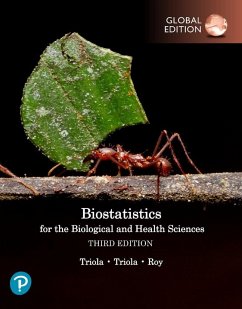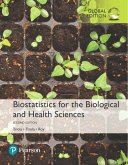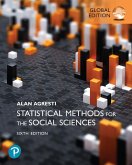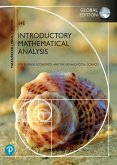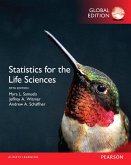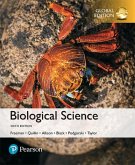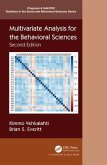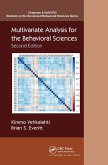Mario Triola, Marc Triola, Jason Roy
Biostatistics for the Biological and Health Sciences, Global Edition
Mario Triola, Marc Triola, Jason Roy
Biostatistics for the Biological and Health Sciences, Global Edition
- Broschiertes Buch
- Merkliste
- Auf die Merkliste
- Bewerten Bewerten
- Teilen
- Produkt teilen
- Produkterinnerung
- Produkterinnerung
Biostatistics for the Biological and Health Sciences brings statistical theories and methods to life with real applications, emphasis on real data, and a friendly writing style. It suits a variety of students in their first statistics course and uses minimal algebra. Abundant examples and emphasis on real data help you develop skills in critical thinking, technology and communication. This collaboration from 2 biological sciences experts and the author of the #1 statistics book is an excellent introduction that is also highly readable, understandable and relevant. The 3rd Edition incorporates…mehr
Andere Kunden interessierten sich auch für
![Biostatistics for the Biological and Health Sciences, Global Edition Biostatistics for the Biological and Health Sciences, Global Edition]() Marc TriolaBiostatistics for the Biological and Health Sciences, Global Edition96,99 €
Marc TriolaBiostatistics for the Biological and Health Sciences, Global Edition96,99 €![Statistical Methods for the Social Sciences, Global Edition Statistical Methods for the Social Sciences, Global Edition]() Alan AgrestiStatistical Methods for the Social Sciences, Global Edition81,99 €
Alan AgrestiStatistical Methods for the Social Sciences, Global Edition81,99 €![Introductory Mathematical Analysis for Business, Economics, and the Life and Social Sciences, Global Edition Introductory Mathematical Analysis for Business, Economics, and the Life and Social Sciences, Global Edition]() Ernest HaeusslerIntroductory Mathematical Analysis for Business, Economics, and the Life and Social Sciences, Global Edition89,99 €
Ernest HaeusslerIntroductory Mathematical Analysis for Business, Economics, and the Life and Social Sciences, Global Edition89,99 €![Statistics for the Life Sciences, Global Edition Statistics for the Life Sciences, Global Edition]() Myra SamuelsStatistics for the Life Sciences, Global Edition95,99 €
Myra SamuelsStatistics for the Life Sciences, Global Edition95,99 €![Biological Science, Global Edition Biological Science, Global Edition]() Scott FreemanBiological Science, Global Edition94,99 €
Scott FreemanBiological Science, Global Edition94,99 €![Multivariate Analysis for the Behavioral Sciences, Second Edition Multivariate Analysis for the Behavioral Sciences, Second Edition]() Kimmo VehkalahtiMultivariate Analysis for the Behavioral Sciences, Second Edition97,99 €
Kimmo VehkalahtiMultivariate Analysis for the Behavioral Sciences, Second Edition97,99 €![Multivariate Analysis for the Behavioral Sciences, Second Edition Multivariate Analysis for the Behavioral Sciences, Second Edition]() Kimmo VehkalahtiMultivariate Analysis for the Behavioral Sciences, Second Edition59,99 €
Kimmo VehkalahtiMultivariate Analysis for the Behavioral Sciences, Second Edition59,99 €-
-
-
Biostatistics for the Biological and Health Sciences brings statistical theories and methods to life with real applications, emphasis on real data, and a friendly writing style. It suits a variety of students in their first statistics course and uses minimal algebra. Abundant examples and emphasis on real data help you develop skills in critical thinking, technology and communication. This collaboration from 2 biological sciences experts and the author of the #1 statistics book is an excellent introduction that is also highly readable, understandable and relevant. The 3rd Edition incorporates the latest methods used by professional statisticians. It offers a wealth of new data sets, examples, and exercises (such as those involving clinical trials, COVID-19, biometrics, and anthropometrics) and includes features that address all recommendations included in the Guidelines for Assessment and Instruction in Statistics Education (GAISE) as recommended by the American Statistical Association.
Produktdetails
- Produktdetails
- Verlag: Pearson Education Limited
- 3 ed
- Seitenzahl: 784
- Erscheinungstermin: 25. Juli 2023
- Englisch
- Abmessung: 217mm x 277mm x 37mm
- Gewicht: 1654g
- ISBN-13: 9781292452012
- ISBN-10: 1292452013
- Artikelnr.: 66800443
- Verlag: Pearson Education Limited
- 3 ed
- Seitenzahl: 784
- Erscheinungstermin: 25. Juli 2023
- Englisch
- Abmessung: 217mm x 277mm x 37mm
- Gewicht: 1654g
- ISBN-13: 9781292452012
- ISBN-10: 1292452013
- Artikelnr.: 66800443
Mark Triola, MD, FACP is the Associate Dean for Educational Informatics at NYU School of Medicine, the founding director of the NYU Langone Medical Center Institute for Innovations in Medical Education (IIME), and an Associate Professor of Medicine. Dr. Triola's research focuses on precision education and the use of AI tools to efficiently personalize medical education for individual learners and give new insights to their programs and coaches. His lab develops new learning technologies and AI-driven educational interventions and also works to define educationally sensitive patient and system outcomes that can be used to assess the impact of training. Dr. Triola and IIME have been funded by the National Institutes of Health, the Josiah Macy Jr. Foundation, the Department of Education, the Department of Defense, and the American Medical Association's Accelerating Change in Medical Education program. Mario F. Triola is a Professor Emeritus of Mathematics at Dutchess Community College, where he has taught statistics for over 30 years. Marty is the author of Elementary Statistics, 14th Edition; Essentials of Statistics, 7th Edition; Elementary Statistics Using Excel, 7th Edition; and Elementary Statistics Using the TI-83/84 Plus Calculator, 5th Edition; and he is a co-author of Statistical Reasoning for Everyday Life, 5th Edition. Elementary Statistics is currently available as an International Edition, and it has been translated into several foreign languages. Marty designed the original Statdisk statistical software, and he has written several manuals and workbooks for technology supporting statistics education. He has been a speaker at many conferences and colleges. Marty's consulting work includes the design of casino slot machines and the design of fishing rods, and he has worked with attorneys in determining probabilities in paternity lawsuits, analyzing data in medical malpractice lawsuits, identifying salary inequities based on gender, and analyzing disputed election results. He has also used statistical methods to analyze medical school surveys, survey results for the New York City Transit Authority, and COVID-19 virus data for government officials. Marty has testified as an expert witness in the New York State Supreme Court. As of this writing, Marty's Elementary Statistics has been the #1 statistics text in the United States for 27 consecutive years. Jason Roy, PhD is a Professor of Biostatistics and Chair of the Department of Biostatistics and Epidemiology at Rutgers University. He is director of Rutgers University Biostatics and Epidemiology Services and co-director of Biostatistics, Epidemiology, and Research Design core, NJ ACTS. Previously, he was Professor of Biostatistics in the Department of Biostatistics, Epidemiology, and Informatics at the University of Pennsylvania. He received his PhD in Biostatistics in 2000 from the University of Michigan. He was the recipient of the 2002 David P. Byar Young Investigator Award from the American Statistical Association Biometrics Section. Dr. Roy is interested in methodological research in developing flexible Bayesian methods for large, observational studies, especially data from EHR and mobile health. He is particularly interested in causal inference problems, where Bayesian nonparametric methods can be used in conjunction with g-computation. He is also interested in functional clustering methods, which can be very useful for extracting features from intensively collected data (such as from mobile devices). Much of his collaborative research is in pharmacoepidemiology.
1. INTRODUCTION TO STATISTICS
o 1-1 Statistical and Critical Thinking
o 1-2 Types of Data
o 1-3 Collecting Sample Data
o 1-4 Ethics in Statistics (download only)
2. EXPLORING DATA WITH TABLES AND GRAPHS
* 2-1 Frequency Distributions for Organizing and Summarizing Data
* 2-2 Histograms
* 2-3 Graphs That Enlighten and Graphs That Deceive
* 2-4 Scatterplots, Correlation, and Regression
1. DESCRIBING, EXPLORING, AND COMPARING DATA
* 3-1 Measures of Center
* 3-2 Measures of Variation
* 3-3 Measures of Relative Standing and Boxplots
2. PROBABILITY
* 4-1 Basic Concepts of Probability
* 4-2 Addition Rule and Multiplication Rule
* 4-3 Complements, Conditional Probability, and Bayes' Theorem
* 4-4 Risks and Odds
* 4-5 Rates of Mortality, Fertility, and Morbidity
* 4-6 Counting
3. DISCRETE PROBABILITY DISTRIBUTIONS
* 5-1 Probability Distributions
* 5-2 Binomial Probability Distributions
* 5-3 Poisson Probability Distributions
4. NORMAL PROBABILITY DISTRIBUTIONS
* 6-1 The Standard Normal Distribution
* 6-2 Real Applications of Normal Distributions
* 6-3 Sampling Distributions and Estimators
* 6-4 The Central Limit Theorem
* 6-5 Assessing Normality
* 6-6 Normal as Approximation to Binomial (download only)
5. ESTIMATING PARAMETERS AND DETERMINING SAMPLE SIZES
* 7-1 Estimating a Population Proportion
* 7-2 Estimating a Population Mean
* 7-3 Estimating a Population Standard Deviation or Variance
* 7-4 Bootstrapping: Using Technology for Estimates
6. HYPOTHESIS TESTING
* 8-1 Basics of Hypothesis Testing
* 8-2 Testing a Claim About a Proportion
* 8-3 Testing a Claim About a Mean
* 8-4 Testing a Claim About a Standard Deviation or Variance
* 8-5 Resampling: Using Technology for Hypothesis Testing
7. INFERENCES FROM TWO SAMPLES
* 9-1 Two Proportions
* 9-2 Two Means: Independent Samples
* 9-3 Matched Pairs
* 9-4 Two Variances or Standard Deviations
* 9-5 Resampling: Using Technology for Inferences
8. CORRELATION AND REGRESSION
* 10-1 Correlation
* 10-2 Regression
* 10-3 Prediction Intervals and Variation
* 10-4 Multiple Regression
* 10-5 Dummy Variables and Logistic Regression
9. GOODNESS-OF-FIT AND CONTINGENCY TABLES
* 11-1 Goodness-of-Fit
* 11-2 Contingency Tables
10. ANALYSIS OF VARIANCE
* 12-1 One-Way ANOVA
* 12-2 Two-Way ANOVA
11. NONPARAMETRIC TESTS
* 13-1 Basics of Nonparametric Tests
* 13-2 Sign Test
* 13-3 Wilcoxon Signed-Ranks Test for Matched Pairs
* 13-4 Wilcoxon Rank-Sum Test for Two Independent Samples
* 13-5 Kruskal-Wallis Test for Three or More Samples
* 13-6 Rank Correlation
12. SURVIVAL ANALYSIS
* 14-1 Life Tables
* 14-2 Kaplan-Meier Survival Analysis
APPENDICES
A: Tables and FormulasB: Data SetsC: Websites and Bibliography of BooksD:
Answers to Odd-Numbered Section Exercises (and all Quick Quizzes, all
Review Exercises, and all Cumulative Review Exercises)Subject Index
o 1-1 Statistical and Critical Thinking
o 1-2 Types of Data
o 1-3 Collecting Sample Data
o 1-4 Ethics in Statistics (download only)
2. EXPLORING DATA WITH TABLES AND GRAPHS
* 2-1 Frequency Distributions for Organizing and Summarizing Data
* 2-2 Histograms
* 2-3 Graphs That Enlighten and Graphs That Deceive
* 2-4 Scatterplots, Correlation, and Regression
1. DESCRIBING, EXPLORING, AND COMPARING DATA
* 3-1 Measures of Center
* 3-2 Measures of Variation
* 3-3 Measures of Relative Standing and Boxplots
2. PROBABILITY
* 4-1 Basic Concepts of Probability
* 4-2 Addition Rule and Multiplication Rule
* 4-3 Complements, Conditional Probability, and Bayes' Theorem
* 4-4 Risks and Odds
* 4-5 Rates of Mortality, Fertility, and Morbidity
* 4-6 Counting
3. DISCRETE PROBABILITY DISTRIBUTIONS
* 5-1 Probability Distributions
* 5-2 Binomial Probability Distributions
* 5-3 Poisson Probability Distributions
4. NORMAL PROBABILITY DISTRIBUTIONS
* 6-1 The Standard Normal Distribution
* 6-2 Real Applications of Normal Distributions
* 6-3 Sampling Distributions and Estimators
* 6-4 The Central Limit Theorem
* 6-5 Assessing Normality
* 6-6 Normal as Approximation to Binomial (download only)
5. ESTIMATING PARAMETERS AND DETERMINING SAMPLE SIZES
* 7-1 Estimating a Population Proportion
* 7-2 Estimating a Population Mean
* 7-3 Estimating a Population Standard Deviation or Variance
* 7-4 Bootstrapping: Using Technology for Estimates
6. HYPOTHESIS TESTING
* 8-1 Basics of Hypothesis Testing
* 8-2 Testing a Claim About a Proportion
* 8-3 Testing a Claim About a Mean
* 8-4 Testing a Claim About a Standard Deviation or Variance
* 8-5 Resampling: Using Technology for Hypothesis Testing
7. INFERENCES FROM TWO SAMPLES
* 9-1 Two Proportions
* 9-2 Two Means: Independent Samples
* 9-3 Matched Pairs
* 9-4 Two Variances or Standard Deviations
* 9-5 Resampling: Using Technology for Inferences
8. CORRELATION AND REGRESSION
* 10-1 Correlation
* 10-2 Regression
* 10-3 Prediction Intervals and Variation
* 10-4 Multiple Regression
* 10-5 Dummy Variables and Logistic Regression
9. GOODNESS-OF-FIT AND CONTINGENCY TABLES
* 11-1 Goodness-of-Fit
* 11-2 Contingency Tables
10. ANALYSIS OF VARIANCE
* 12-1 One-Way ANOVA
* 12-2 Two-Way ANOVA
11. NONPARAMETRIC TESTS
* 13-1 Basics of Nonparametric Tests
* 13-2 Sign Test
* 13-3 Wilcoxon Signed-Ranks Test for Matched Pairs
* 13-4 Wilcoxon Rank-Sum Test for Two Independent Samples
* 13-5 Kruskal-Wallis Test for Three or More Samples
* 13-6 Rank Correlation
12. SURVIVAL ANALYSIS
* 14-1 Life Tables
* 14-2 Kaplan-Meier Survival Analysis
APPENDICES
A: Tables and FormulasB: Data SetsC: Websites and Bibliography of BooksD:
Answers to Odd-Numbered Section Exercises (and all Quick Quizzes, all
Review Exercises, and all Cumulative Review Exercises)Subject Index
1. INTRODUCTION TO STATISTICS
o 1-1 Statistical and Critical Thinking
o 1-2 Types of Data
o 1-3 Collecting Sample Data
o 1-4 Ethics in Statistics (download only)
2. EXPLORING DATA WITH TABLES AND GRAPHS
* 2-1 Frequency Distributions for Organizing and Summarizing Data
* 2-2 Histograms
* 2-3 Graphs That Enlighten and Graphs That Deceive
* 2-4 Scatterplots, Correlation, and Regression
1. DESCRIBING, EXPLORING, AND COMPARING DATA
* 3-1 Measures of Center
* 3-2 Measures of Variation
* 3-3 Measures of Relative Standing and Boxplots
2. PROBABILITY
* 4-1 Basic Concepts of Probability
* 4-2 Addition Rule and Multiplication Rule
* 4-3 Complements, Conditional Probability, and Bayes' Theorem
* 4-4 Risks and Odds
* 4-5 Rates of Mortality, Fertility, and Morbidity
* 4-6 Counting
3. DISCRETE PROBABILITY DISTRIBUTIONS
* 5-1 Probability Distributions
* 5-2 Binomial Probability Distributions
* 5-3 Poisson Probability Distributions
4. NORMAL PROBABILITY DISTRIBUTIONS
* 6-1 The Standard Normal Distribution
* 6-2 Real Applications of Normal Distributions
* 6-3 Sampling Distributions and Estimators
* 6-4 The Central Limit Theorem
* 6-5 Assessing Normality
* 6-6 Normal as Approximation to Binomial (download only)
5. ESTIMATING PARAMETERS AND DETERMINING SAMPLE SIZES
* 7-1 Estimating a Population Proportion
* 7-2 Estimating a Population Mean
* 7-3 Estimating a Population Standard Deviation or Variance
* 7-4 Bootstrapping: Using Technology for Estimates
6. HYPOTHESIS TESTING
* 8-1 Basics of Hypothesis Testing
* 8-2 Testing a Claim About a Proportion
* 8-3 Testing a Claim About a Mean
* 8-4 Testing a Claim About a Standard Deviation or Variance
* 8-5 Resampling: Using Technology for Hypothesis Testing
7. INFERENCES FROM TWO SAMPLES
* 9-1 Two Proportions
* 9-2 Two Means: Independent Samples
* 9-3 Matched Pairs
* 9-4 Two Variances or Standard Deviations
* 9-5 Resampling: Using Technology for Inferences
8. CORRELATION AND REGRESSION
* 10-1 Correlation
* 10-2 Regression
* 10-3 Prediction Intervals and Variation
* 10-4 Multiple Regression
* 10-5 Dummy Variables and Logistic Regression
9. GOODNESS-OF-FIT AND CONTINGENCY TABLES
* 11-1 Goodness-of-Fit
* 11-2 Contingency Tables
10. ANALYSIS OF VARIANCE
* 12-1 One-Way ANOVA
* 12-2 Two-Way ANOVA
11. NONPARAMETRIC TESTS
* 13-1 Basics of Nonparametric Tests
* 13-2 Sign Test
* 13-3 Wilcoxon Signed-Ranks Test for Matched Pairs
* 13-4 Wilcoxon Rank-Sum Test for Two Independent Samples
* 13-5 Kruskal-Wallis Test for Three or More Samples
* 13-6 Rank Correlation
12. SURVIVAL ANALYSIS
* 14-1 Life Tables
* 14-2 Kaplan-Meier Survival Analysis
APPENDICES
A: Tables and FormulasB: Data SetsC: Websites and Bibliography of BooksD:
Answers to Odd-Numbered Section Exercises (and all Quick Quizzes, all
Review Exercises, and all Cumulative Review Exercises)Subject Index
o 1-1 Statistical and Critical Thinking
o 1-2 Types of Data
o 1-3 Collecting Sample Data
o 1-4 Ethics in Statistics (download only)
2. EXPLORING DATA WITH TABLES AND GRAPHS
* 2-1 Frequency Distributions for Organizing and Summarizing Data
* 2-2 Histograms
* 2-3 Graphs That Enlighten and Graphs That Deceive
* 2-4 Scatterplots, Correlation, and Regression
1. DESCRIBING, EXPLORING, AND COMPARING DATA
* 3-1 Measures of Center
* 3-2 Measures of Variation
* 3-3 Measures of Relative Standing and Boxplots
2. PROBABILITY
* 4-1 Basic Concepts of Probability
* 4-2 Addition Rule and Multiplication Rule
* 4-3 Complements, Conditional Probability, and Bayes' Theorem
* 4-4 Risks and Odds
* 4-5 Rates of Mortality, Fertility, and Morbidity
* 4-6 Counting
3. DISCRETE PROBABILITY DISTRIBUTIONS
* 5-1 Probability Distributions
* 5-2 Binomial Probability Distributions
* 5-3 Poisson Probability Distributions
4. NORMAL PROBABILITY DISTRIBUTIONS
* 6-1 The Standard Normal Distribution
* 6-2 Real Applications of Normal Distributions
* 6-3 Sampling Distributions and Estimators
* 6-4 The Central Limit Theorem
* 6-5 Assessing Normality
* 6-6 Normal as Approximation to Binomial (download only)
5. ESTIMATING PARAMETERS AND DETERMINING SAMPLE SIZES
* 7-1 Estimating a Population Proportion
* 7-2 Estimating a Population Mean
* 7-3 Estimating a Population Standard Deviation or Variance
* 7-4 Bootstrapping: Using Technology for Estimates
6. HYPOTHESIS TESTING
* 8-1 Basics of Hypothesis Testing
* 8-2 Testing a Claim About a Proportion
* 8-3 Testing a Claim About a Mean
* 8-4 Testing a Claim About a Standard Deviation or Variance
* 8-5 Resampling: Using Technology for Hypothesis Testing
7. INFERENCES FROM TWO SAMPLES
* 9-1 Two Proportions
* 9-2 Two Means: Independent Samples
* 9-3 Matched Pairs
* 9-4 Two Variances or Standard Deviations
* 9-5 Resampling: Using Technology for Inferences
8. CORRELATION AND REGRESSION
* 10-1 Correlation
* 10-2 Regression
* 10-3 Prediction Intervals and Variation
* 10-4 Multiple Regression
* 10-5 Dummy Variables and Logistic Regression
9. GOODNESS-OF-FIT AND CONTINGENCY TABLES
* 11-1 Goodness-of-Fit
* 11-2 Contingency Tables
10. ANALYSIS OF VARIANCE
* 12-1 One-Way ANOVA
* 12-2 Two-Way ANOVA
11. NONPARAMETRIC TESTS
* 13-1 Basics of Nonparametric Tests
* 13-2 Sign Test
* 13-3 Wilcoxon Signed-Ranks Test for Matched Pairs
* 13-4 Wilcoxon Rank-Sum Test for Two Independent Samples
* 13-5 Kruskal-Wallis Test for Three or More Samples
* 13-6 Rank Correlation
12. SURVIVAL ANALYSIS
* 14-1 Life Tables
* 14-2 Kaplan-Meier Survival Analysis
APPENDICES
A: Tables and FormulasB: Data SetsC: Websites and Bibliography of BooksD:
Answers to Odd-Numbered Section Exercises (and all Quick Quizzes, all
Review Exercises, and all Cumulative Review Exercises)Subject Index

